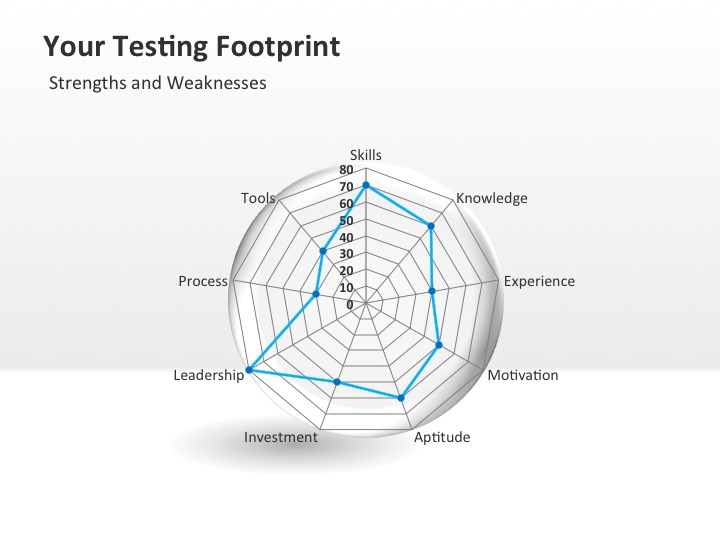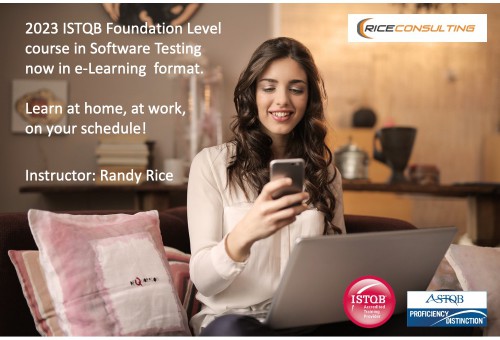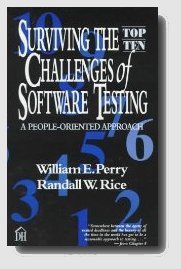 Do you feel that you need an independent and unbiased assessment of your organization’s current software development and testing practices? Sometimes you might feel that you know the right direction for improvement, but need an external opinion. Other times, you just need fresh ideas and objective feedback.
Do you feel that you need an independent and unbiased assessment of your organization’s current software development and testing practices? Sometimes you might feel that you know the right direction for improvement, but need an external opinion. Other times, you just need fresh ideas and objective feedback.
Our on-site assessments include interviews with key staff at all levels in your organization including testers, test managers, developers, QA team, project managers, business units and senior managers, along with observations of how you actually perform tests, and a review of your existing test documentation.
These assessments are based on over 30 years consulting and practitioner experience in working with organizations worldwide to improve their software testing and development practices.
The goals of the assessments are to:
• To build upon the strengths of your current processes and practices
• To pinpoint areas of potential test process and organizational improvement
• To align test improvement efforts with your organization’s long term strategic goals
• To produce a meaningful report which coveys details of how to show rapid improvement while sustaining long-term improvement goals
• To help secure senior management support by getting the objective recommendations of a credible testing authority
Just two or three minor changes in test practices can result in tremendous overall improvements to your testing efforts.
We offer the following assessments to help determine how your testing efforts are performing and how to improve them:
• The Software Testing Maturity Assessment
• The Software Testing Practices Assessment
• The Software Testing Skills Assessment
• The Software Life Cycle Assessment
• The Agile Software Testing Assessment
• The Software Test Team Assessment
• The Software Test Tools and Automation Assessment
• The Cybersecurity Testing Assessment
• The Exploratory Testing Capabilities Assessment
Unique Features
 Results are displayed on a radar chart footprint as opposed to maturity levels. This offers an advantage by not limiting improvement efforts to merely climbing the steps of a maturity ladder. Instead, you can easily see areas of strength and weakness. By expanding your footprint, you can show improvement in one or more dimensions of the assessment.
Results are displayed on a radar chart footprint as opposed to maturity levels. This offers an advantage by not limiting improvement efforts to merely climbing the steps of a maturity ladder. Instead, you can easily see areas of strength and weakness. By expanding your footprint, you can show improvement in one or more dimensions of the assessment.
Each assessment is different. Before the visit, we work to define your goals and which areas you would like to know about in your testing organization and practices. Other assessments are based on a standard set of non-customizable criteria that may or may not be of help to you.
The assessment framework is simple in concept, but powerful in results. Instead of reading a 200+ page document with many processes and sub-processes, this assessment has a targeted set of customizable criteria based on your own needs. This allows you to improve where you need it most and also works alongside today’s compressed testing timeframes.
Each assessment is conducted at your site and in person. Our experience is that remote assessments may at first sound more expedient, but they do not allow the assessor to detect things outside of questions. For example, body language is hard to detect even in video calls. Also, direct observation of testing practices is hard to perform remotely.
The deliverable from each assessment is a detailed report containing a concise action plan for improvement. This action plan is broken down into short-term, mid-term, and long-term objectives and tasks.
We support you after the assessment. Most assessments will include tasks requiring outside expertise at times. We support every assessment as a follow-on service if you desire.
Your assessor will be Randall (Randy) Rice, a software test/QA practitioner and developer with over 40 years experience in building and testing critical information systems in just about every industry sector worldwide. Randy holds all ISTQB Advanced certifications as well as being the co-author of two books on software testing. Randy works with all software development life cycles and with a wide range of testing tools.
Types of Assessments Offered
The Software Testing Maturity Assessment
The testing maturity assessment is a quick and effective way for an organization to determine where they are in terms of software testing maturity. This assessment is designed for organizations that have requirements for highly repeatable testing processes. The assessment looks at three areas that are critical to testing:
• Test Organization - Who performs testing, what levels of experience are present, and when testing is performed in the development/maintenance life cycle.
• Test Process Maturity - How well-defined, well-deployed, and repeatable the test process is, and whether it incorporates good testing management, practices, tools, and techniques.
• Readiness for Improvement - An assessment of the organization's readiness to improve the testing process. This involves an assessment of the staff's testing awareness, testing skills, and motivation to change current practices.
The deliverable is a report detailing the assessment's findings, a recommended quality improvement strategy, and a plan for addressing the improvement needs identified. If the assessment uncovers the need for in-house skills training and consulting, we will include proposed training and consulting plans in the report. The report is typically about 15 pages in length, but can be longer if you desire for specific areas to be explored and assessed.
The Software Testing Practices Assessment
This is similar to the software testing maturity assessment, but the focus is on key dimensions of effective testing practices instead of process maturity. We examine test effectiveness, test efficiency, team skills and competencies, investment, readiness to change, tooling and technology, and any other areas you may choose to add.
The Software Testing Skills Assessment
This assessment examines each individual’s skill levels based on core competencies for testing as well as other skills that you wish to have assessed. We produce a skills footprint for each person. An organizational footprint will also be produced, in addition to skill building action plans and the individual level and organizational level.
The Software Life Cycle Assessment
This is a wide-ranging assessment that examines all facets of how an organization develops, tests, delivers and maintains software and systems. The assessment looks at what you are currently doing in a life cycle approach and benchmarks to good practice. No matter what kind of software life cycle you employ - waterfall, agile, DevOps, or a hybrid approach - we can help identify gaps and opportunities for improvement.
Agile Software Testing Assessment
This assessment helps people in organizations that apply agile methodologies for software development. The assessment looks at key areas that are critical to success in testing in the agile context:
• Test organization - Who performs testing, what levels of experience are present, and when testing is performed in the agile development/maintenance life cycle.
• Testing practices – Which kinds of tests are being performed, the effectiveness of the tests, and the effectiveness of test automation.
• Teamwork – How testers are perceived in the agile teams, and to what degree the testers possess the needed skills to make the agile teams successful
• Test automation – Are the automation tools and practices effectively being applied?
• Readiness for improvement - An assessment of the organization's readiness to improve testing practices. This involves an assessment of the staff's testing awareness, testing skills, and motivation to change current practices.
The Software Test Team Assessment
This assessment examines how your team(s) are performing in software testing. Teamwork and skills are primary areas of focus, but other areas such as motivation, learning, use of tools, and innovation are also assessed.
The Software Test Tools and Automation Assessment
This assessment examines how well you are applying test tools, including test automation. This is not a tool search, but the findings can be used as the basis for tool needs in a tool search.
Cybersecurity Testing Assessment
This assessment examines the adequacy of cybersecurity testing efforts in your organization. Many organizations think they have cybersecurity defenses in place, but few people know if their defenses are actually working well because they have never been tested. This assessment helps to find those gaps and weaknesses to help you have a robust cybersecurity testing effort.
The Exploratory Assessment of Testing Capabilities
This assessment is a free-form exploratory approach to assessing your current testing capabilities. We start with topics you wish to have investigated and may branch out as we find areas that deserve further examination. Like with the other assessments, the deliverable is an informative report with a radar chart of your organization’s testing footprint.













